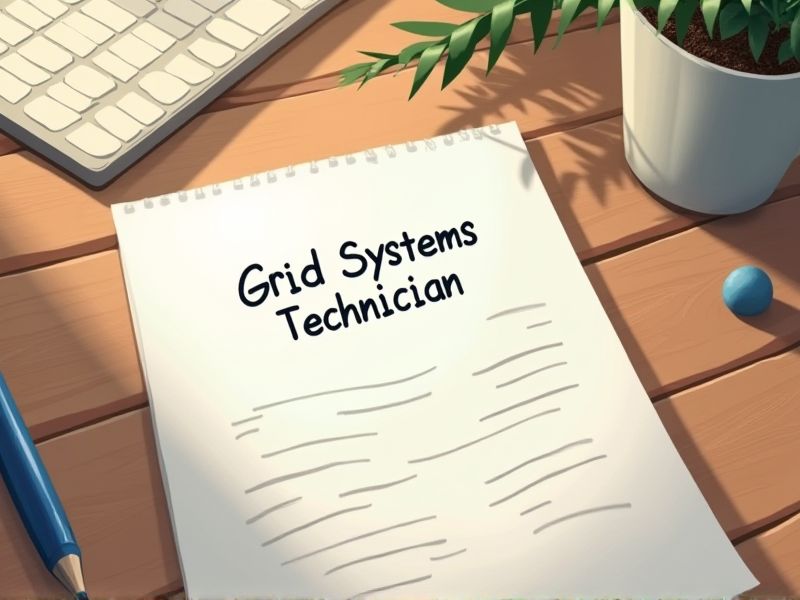
Grid Systems Technicians are essential in maintaining and optimizing the complex networks that deliver electricity across regions. Certifications ensure that these technicians possess the necessary skills to safely and efficiently manage grid technologies. With a focus on adhering to safety standards and industry advancements, certified technicians are equipped to handle the challenges of modern grid systems. Here are some important certifications you may need to become a Grid Systems Technician.
CompTIA A+ Certification
Grid Systems Technicians require a CompTIA A+ Certification because it provides foundational knowledge crucial for understanding computer hardware and software systems. The certification validates problem-solving skills, which are essential for diagnosing and fixing technical issues in grid infrastructure. Employers value the certification as it demonstrates a technician's ability to handle complex technical environments. Enhanced system reliability and operational efficiency in grid systems often result from certified technicians' expertise.
CompTIA Network+ Certification
Grid Systems Technicians rely on robust networking knowledge to ensure seamless communication across grid infrastructures. CompTIA Network+ Certification provides foundational skills crucial for diagnosing and resolving network issues. The certification validates an understanding of network protocols, crucial for efficient grid management. Grid systems, dependent on real-time data flow, require certified professionals to maintain optimal network performance.
CompTIA Security+ Certification
Grid systems technicians work with critical infrastructure that requires robust cybersecurity measures, making a deep understanding of security principles essential. CompTIA Security+ certification provides foundational knowledge in identifying and mitigating security threats, which is crucial for protecting grid systems. Employing technicians with this certification helps ensure compliance with industry standards and regulations, minimizing the risk of cyber incidents. Organizations value this credential as it validates the technician's capability to implement and maintain security protocols effectively.
Cisco Certified Network Associate (CCNA)
A Grid Systems Technician often requires a foundational understanding of networking to efficiently manage and troubleshoot infrastructure, making the CCNA certification valuable. CCNA provides insight into networking protocols and devices, which is crucial for ensuring seamless communication within grid systems. The certification also imparts skills in configuring and managing network equipment, essential for maintaining grid reliability and performance. Possessing CCNA certification can enhance job prospects and validate the technician's competence in handling complex network challenges.
Microsoft Certified: Azure Fundamentals
Grid Systems Technicians often work with cloud infrastructure to manage and maintain complex electrical grids, making Azure knowledge beneficial. Microsoft Certified: Azure Fundamentals provides a foundational understanding of cloud services, enhancing their ability to integrate and optimize grid operations. Grid systems increasingly rely on data analysis and real-time monitoring, skills fortified through Azure's cloud capabilities. As smart grid technologies evolve, having a certification in Azure ensures technicians can leverage cutting-edge solutions effectively.
Red Hat Certified System Administrator (RHCSA)
A Grid Systems Technician often deals with complex network infrastructure, and the RHCSA certification equips them with essential skills in managing and configuring Linux systems, which is a critical component in many grid computing environments. The certification ensures proficiency in handling system operations, including setting permissions and managing resources, crucial for maintaining the reliability of grid systems. RHCSA validation demonstrates a foundational understanding of system troubleshooting, enhancing the technician's ability to quickly resolve issues that could disrupt grid processing tasks. Organizations using grid systems often rely on Linux-based solutions, making RHCSA certification a valuable asset for aligning technical competencies with industry needs.
Linux Professional Institute Certification (LPIC-1)
Linux operating systems form a crucial backbone for many grid computing environments, necessitating proficiency that the LPIC-1 certification validates. LPIC-1 equips Grid Systems Technicians with essential skills in Linux maintenance, troubleshooting, and command-line operations, directly impacting system reliability. Employers often prefer certified professionals as LPIC-1 demonstrates a recognized level of competency and commitment. In grid systems where distributed resources need efficient management, the expertise validated by LPIC-1 enhances operational effectiveness and reduces downtime.
VMware Certified Professional - Data Center Virtualization (VCP-DCV)
Understanding virtualization is crucial for Grid Systems Technicians due to the reliance on virtual environments to efficiently manage data centers. The VCP-DCV certification provides specialized knowledge in VMware technologies, which dominate the virtualization market, thus enhancing a technician's skill set. Expertise in VMware enables technicians to optimize resource allocation and improve system resilience within grid infrastructures. The certification validates proficiency in these areas, making it essential for those focused on maximizing data center performance.
AWS Certified Solutions Architect - Associate
Grid Systems Technicians benefit from AWS Certified Solutions Architect - Associate by gaining expertise in cloud infrastructure design, crucial for modern grid management. Grids increasingly rely on cloud technology to handle data analytics and real-time monitoring; the certification provides the skills to optimize these processes. It ensures technicians can implement cost-effective and scalable solutions, enhancing the efficiency of energy distribution systems. Certified knowledge in cloud architecture helps mitigate risks and improve resilience against system disruptions.
Certified Information Systems Security Professional (CISSP)
The complexity of grid systems demands robust security measures, which can be ensured by professionals holding a CISSP certification. This certification equips technicians with a comprehensive understanding of information systems security, crucial for protecting critical infrastructure. Grid systems are increasingly becoming targets for cyber threats, necessitating the advanced risk management and mitigation skills that a CISSP-certified technician offers. By adhering to the highest security standards, CISSP holders help safeguard grid systems' reliability and continuity, mitigating potential operational disruptions.
Summary
By obtaining certifications, you enhance your credibility and employability in the industry. Certified Grid Systems Technicians often experience increased job opportunities and potential for career advancement. Employers may offer higher salaries to certified professionals due to their verified skills and knowledge. You might also find greater job satisfaction as certifications provide confidence and recognition in your technical abilities.
